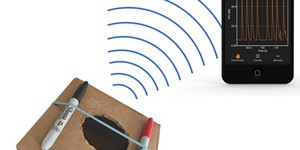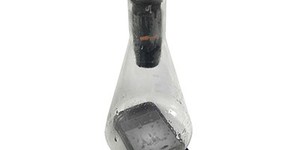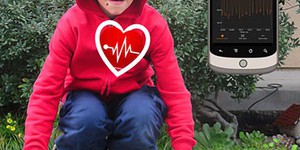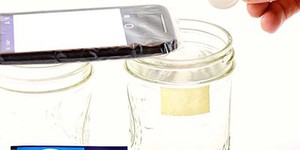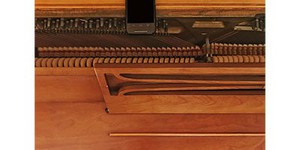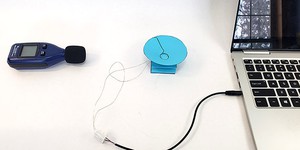How to Calibrate the Sound Sensor in Phyphox
Log In
Want to learn more? Check out these other resources:
Area of Science
If you're interested in object motion and enjoy building things or taking mechanical things apart to see how they work, then it sounds like you'd be interested in mechanical engineering.
Read more
Lesson Plan
Grade: 6th-8th
4 reviews
Do your students ever wish they could block out an annoying noise or music they don't like? In this fun lesson plan, they will design sound-insulating containers and measure how well they work using a mobile phone and a sensor app.
Read more
NGSS Performance Expectations:
- MS-PS4-2. Develop and use a model to describe that waves are reflected, absorbed, or transmitted through various materials.
- MS-ETS1-2. Evaluate competing design solutions using a systematic process to determine how well they meet the criteria and constraints of the problem.
Lesson Plan
Grade: 6th-8th
4 reviews
We hear the word "digital" all the time—digital technology, digital device, digital TV, etc. But what does it actually mean? In this lesson plan, your students will learn how digital signals allow us to reliably transmit and store information.
Read more
NGSS Performance Expectations:
- MS-PS4-3. Integrate qualitative scientific and technical information to support the claim that digitized signals are a more reliable way to encode and transmit information than analog signals.
Lesson Plan
Grade: 6th-8th
We are surrounded by sounds every day, ranging from unpleasant ones like traffic noise to enjoyable ones like music or singing birds. What makes these sounds different? Why are some louder or higher pitched than others? In this lesson plan, your students will investigate how the properties of a sound wave, like frequency and amplitude, affect the sounds we hear. They will do this using a sensor app than can record sound and frequency data with a mobile phone and a homemade musical…
Read more
NGSS Performance Expectations:
- MS-PS4-1. Use mathematical representations to describe a simple model for waves that includes how the amplitude of a wave is related to the energy in a wave.
Lesson Plan
Grade: 6th-8th
Do you feel like it is always too loud in your classroom? In this lesson you can find out exactly how loud it is. Using a mobile phone and a sensor app, your students will measure and graph the sound levels in your classroom for different working scenarios. How loud are your students when doing independent work, having a group discussion, or listening to their teacher? Based on your students' data, you will determine as a class which sound levels are ideal for each scenario and create a…
Read more
NGSS Performance Expectations:
- MS-PS4-1. Use mathematical representations to describe a simple model for waves that includes how the amplitude of a wave is related to the energy in a wave.
Have you ever wondered what sounds you can hear in space? The answer is simple: none! In outer space there is utter silence. There are no sounds of traffic jams or thunderstorms or crashing waves. No buzzing bees or babies crying. Just silence. In this experiment, you will discover why empty space is void of sound and prove it with the help of the microphone in your phone and a sensor app.
Read more
Your heart starts beating before you are born and keeps right on going through your whole life. Over an average lifetime, the human heart beats more than 2.5 billion times. Keeping your heart healthy means eating right, not smoking, and getting regular exercise. Which of your favorite physical activities give your heart the best workout and help keep it fit? In this science project, you will use a smartphone equipped with a sensor app to visualize your heart rate and find out which…
Read more
Can you hear me now . . . ? Just how loud does a sound have to be for us to hear it? And how loud is too loud for our ears? Learn to measure levels of sound in this project, and discover the amazing auditory range your ears can detect in the noisy world around you. If you have a smartphone handy, you can even do this project without purchasing any additional materials, by using your phone's sound sensor and a sensor app.
Read more
Alka-Seltzer® tablets fizzle furiously when dropped into water. The moment the tablet starts dissolving, a chemical reaction occurs that releases carbon dioxide gas. In this science project, you can even measure how long and loudly your tablet fizzes using a smartphone equipped with a sensor app. Do you think you can make Alka-Seltzer fizz faster or more loudly by changing the temperature of the water? How big of a difference in the rate of a chemical reaction can temperature make?
Read more
The renowned pianist Vladimir Horowitz once said, "The most important thing is to transform the piano from a percussive instrument into a singing instrument." In this project, you will learn how you can make piano strings sing using sympathetic vibrations. Find out which notes make another one sing the longest by measuring their sound intensities using a smartphone equipped with a sensor app.
Read more
Can you build a working speaker out of paper? How does a speaker's ability to play low or high-pitched notes depend on its size? Explore the science of sound in this project as you build and test your own speakers in order to answer these questions!
Read more
You might think that one sure-fire way to keep your computer safe from hackers is to disconnect it from the internet entirely. But did you know that even without internet, a computer can transmit data using light, sound, vibrations, or even heat? In this project, you will investigate how a spy or hacker can steal data from an "air-gapped" computer that has no internet connection. You can even use a smartphone equipped with a sensor app to demonstrate how the data can be picked up by a nearby…
Read more
Explore Our Science Videos
How to Make Magnetic Slime
Write and Read Braille – STEM activity
Make a Whirlybird from Paper






